- Home
- Various Authors
International Speculative Fiction #4
International Speculative Fiction #4 Read online
EPUB Edition 2013-05-08
Edited by Roberto Mendes and Ricardo Loureiro
with contributions by The ISF Team
Published by
International Speculative Fiction in association with Hipper Tiger Books and IndieBookLauncher.com
ISBN's:
EPUB edition: 978-1-927624-03-6
Kindle edition: 978-1-927624-04-3
PDF edition: 978-1-927624-05-0
This issue and other ISF issues are available in EPUB, Kindle, and PDF format at InternationalSF.wordpress.com
Copyrights to the pictures, stories, and articles in this e-book are held by their respective authors. This e-book file is provided for your personal use (including one-time printout of the PDF edition). Republishing stories, articles, or images online or in print (including making them available for download or feeding them into peer-to-peer networks) without the explicit authorization of the copyright holder is against the law.
Credits
ISF #4 features the work of:
Zoran Živković
S. P. Somtow
Ken Liu
Michael A. Morrison
Sean Wright
Jorge Candeias
Editor In Chief: Roberto Mendes
Fiction Editor: Ricardo Loureiro
Non-Fiction Editor: Nas Hedron
Magazine Designer: Ana Ferreira
Slush Readers: Ana Cristina Rodrigues, Ana Raquel Margato, Diana Pinguicha
The ISF Consultant Panel: Ellen Datlow, Paul Di Filippo
Cover Illustration: George Munteanu
E-publishing services provided by IndieBookLauncher.com
Cover Design: Saul Bottcher
Copy Editing and Proofreading: Nas Hedron
EPUB/Kindle Preparation: Saul Bottcher
Table of Contents
Preliminaries
Cover Page
Title Page
Credits
Translation and First Publication Credits
Editorial (Ricardo Loureiro)
Editorial (Nassau Hedron)
Fiction
The Astronomer (Zoran Živković)
The Bird Catcher (S. P. Somtow)
Algorithms for Love (Ken Liu)
Non-Fiction
The Metaphysical Fantasias of Zoran Živković (Michael A. Morrison)
Fantastika and the Literature of Serbia: A Conversation with Zoran Živković
Reviews by Sean Wright
Reviews by Jorge Candeias
Information
About George Munteanu
Artwork by George Munteanu: #1, #2, #3, #4, #5
About ISF
How to Submit
Meet the ISF Team
About IndieBookLauncher.com
Translation and First Publication Credits
The Astronomer
Zoran Živković
Translated by Alice Copple-Tošić
First appeared in the mosaic novel Time Gifts (1997)
Runner-up for the 1998 NIN Award
The Bird Catcher
S.P. Somtow
First appeared in the Anthology Museum of Horrors (2002)
Winner of the World Fantasy Award for best novella in 2002
Algorithms for Love
Ken Liu
First appeared in Strange Horizons (12 July 2004)
Fantastika and the Literature of Serbia
(Full title: Fantastika and the Literature of Serbia: A Conversation with Zoran Živković)
Michael A. Morrison
First appeared in World Literature Today (November 2011)
The Metaphysical Fantasias of Zoran Živković
Michael A. Morrison
First appeared in World Literature Today (November 2011)
Editorial (Ricardo Loureiro)
So we’ve reached issue 4 and this, let me tell you, is going to be an awesome issue. Not that the previous ones weren’t, mind you, but... well, keep on reading.
First let me introduce our new non-fiction editor, Mr. Nas Hedron. From now on Nas will be the one to select the high quality non-fiction articles that ISF strives to bring to its loyal readers every issue. Mr. Hedron maintains a blog at www.NassauHedron.com that I urge you to seek out. It’s full of interesting stuff.
On the fiction side this issue, as I’ve already hinted, is simply awesome. We’ve gathered a roster of fabulous authors, all of them winners of several awards.
Zoran Živković is a writer, essayist, publisher, and translator from Serbia. The very first time I read his prose, as I recall, it was The Violin Maker, originally published in Interzone #176. I was instantly captivated, so I’m extremely proud to have secured permission to reprint one of his stories, The Astronomer. This novelette, published in 1999, is the first in a series of short works of fiction that together make up the Time Gifts series, and after you’ve read it you’ll know what kind of gift he’s writing about. Finally I point you to Mr. Živković’s web site at www.ZoranZivkovic.com.
And when my editor-in-chief emailed me to say that we had permission to reprint a novelette by S. P. Somtow I was, to put it mildly, flabbergasted. I mean, S.P. Somtow! Ever since I read his horror novel Vampire Junction back in 1984 I’ve been addicted to his prose. But Mr. Somtow is far more than just a writer of horror/fantasy. Perhaps not as well known is his work as a musician and composer, with five symphonies and a ballet to his credit, not to mention several operas. Currently Mr. Somtow is artistic director of the Bangkok Opera, and in 2006 he initiated a program to bring the entire Ring Cycle by Wagner to Southeast Asia. We at ISF are extremely proud to bring you The Bird Catcher, a novelette that’s far more than a cautionary tale about the traumas of war and the boogieman. This story was nominated for Superior Achievement in Long Fiction in the 2001 Bram Stoker Awards and went on to win Best Novella in the 2002 World Fantasy Awards. As always I recommend that you visit Mr. Somtow’s site at www.Somtow.com.
And rounding out the fiction in this issue, Mr. Ken Liu once again graces our magazine, this time with Algorithms for Love, a story that I can only describe as The Matrix for the thinking reader and far more interesting and thought provoking than the movie could ever hope to be. Be sure to visit his site at KenLiu.name.
There’s more to this issue, but I’ll leave those introductions to Mr. Hedron. As always we’re very happy with this issue and hope that you find it interesting and well worth your time. Drop us a comment at InternationalSF.wordpress.com.
Until then, farewell Dear Reader.
—Ricardo Loureiro, Fiction Editor
Editorial (Nassau Hedron)
Before I talk about this issue, I want to say a brief but heartfelt thank you to the ISF team for inviting me aboard. Fábio Fernandes set a very high standard for ISF’s non-fiction and I have no intention of letting that standard slip.
In this issue we have a real treat for you: a trio of pieces by and about Serbian author Zoran Živković. Ricardo has introduced the fiction side of the equation, but this is enhanced and contextualized by two non-fiction articles. Both come from Michael A. Morrison, who is not only a professor in the Department of Physics and Astronomy at the University of Oklahoma, but also an inveterate literary reviewer and essayist with a special interest in the fantastic.
In The Metaphysical Fantasias of Zoran Živković, Morrison not only provides an overview of Živković’s fictional universe, he also locates the author in the larger context of literature.
And in Fantastika and the Literature of Serbia, Morrison gives us an in-depth interview that ranges across a variety of topics, from the fantastic in literature, to Živković’s transition from scholar to novelist, to a detailed look at the author�
�s oevre. Morrison even draws Živković into giving a detailed commentary on his various works, something he’s refused to do in the past.
ISF’s non-fiction offerings have frequently delivered breadth, taking readers from country to country and from one literary form to another, embracing all the variety that speculative fiction has to offer. In this issue we also deliver depth, giving you a taste of Zoran Živković’s impressive fiction, delivering an overview of his work, and allowing you to meet the man himself. Enjoy the ride!
—Nas Hedron, Non-Fiction Editor
The Astronomer
Zoran Živković
1
He had to escape from the monastery.
He should not have been there at all; he had never wanted to become a monk. He’d said so to his father, but his father had been unrelenting, as usual, and his mother did not have the audacity to oppose him, even though she knew that her son’s inclinations and talents lay elsewhere. The monks had treated him badly from the beginning. They had abused and humiliated him, forcing him to do the dirtiest jobs, and when their nocturnal visits commenced he could stand it no longer.
He set off in flight and a whole throng of pudgy, unruly brothers started after him, screaming hideously, torches and mantles raised, certain he could not get away. His legs became heavier and heavier as he attempted to reach the monastery gate, but it seemed to be deliberately withdrawing, becoming more distant at every step.
And then, when they had just about reached him, the monks suddenly stopped in their tracks. Their obscene shouts all at once turned into frightened screams of distress. They began to cross themselves feverishly, pointing to something in front of him, but all he could see there was the wide open gate and the clear night sky stretching beyond it. The gate no longer retreated before him and once again he felt light and fast.
He was filled with tremendous relief when he reached the arched vault of the great gate. He knew they could no longer reach him, that he had gotten away. He stepped outside to meet the stars, but his foot did not alight on solid ground as it should have done. It landed on something soft and spongy, and he started to sink as though he’d stepped in quicksand. He flailed his arms but could find no support.
He realized what he had fallen into by the terrible stench. It was the deep pit at the bottom of the monastery walls; the cooks threw the unusable entrails of slaughtered animals into it every day through a small, decayed wooden door. The cruel priests often threatened the terrified boy that he, too, would end up there if he did not satisfy their aberrant desires. The pit certainly should not have been located at the entrance to the holy edifice, but this utmost sacrilege for some reason seemed neither strange nor unfitting.
He began to sink rapidly into the thick tangle of bloated intestines, and when they almost reached his shoulders he became terror-stricken. Just a few more moments and he would founder completely in this slimy morass. Unable to do anything else, he raised his desperate eyes, and there, illuminated by the reflection of the distant torches, he saw the silhouette of a naked, bony creature squatting on the edge of the pit, looking at him maliciously and snickering.
He did not discern the horns and tail, but even without these features he had no trouble understanding who it was; now that it was too late, he realized whom the terrified monks had seen. He froze instinctively at this pernicious stare, wishing suddenly to disappear as soon as possible under the slimy surface and hide there. All at once the blood and stench no longer made him nauseous; now they seemed precious, like the last refuge before the most terrible of all fates.
And truly, once he had plunged completely into that watery substance, it turned out that it was not, after all, the discarded entrails of pigs, sheep, and goats, as it had seemed to be, but was a mother’s womb, comfortable and warm. He curled up in it, knees under his chin, as endless bliss filled his being. No one could touch him here; he was safe, protected.
The illusion of paradise was not allowed to last very long, however. Demonic eyes, like a sharp awl, quickly pierced through the layers of extraneous flesh and reached his tiny crouched being. He tried to withdraw before them, to retreat deeper into the womb, to the very bottom, but his persecutor did not give up. The thin membrane that surrounded his refuge burst the moment he leaned his back against it, having nowhere else to go, and he fell out—into reality.
And with him, out of his dream, came the eyes that persisted in their piercing stare.
He could not see them in the almost total darkness, but their immaterial touch was nearly palpable. Suddenly awake, he realized that someone else was with him in the cell. He had not heard them come in, even though the door squeaked terribly, since probably no one had thought to oil it in years. How strange for him to fall into such a deep sleep; the night before their execution, only the toughest criminals managed to do that. They were not burdened by their conscience or the thought of impending death, and he certainly was not one of them.
He raised his head a bit and looked around, confused. Although he felt he was not alone, his heart started racing when he really did see the shape of a large man sitting on the bare boards of the empty bed across from him. If not for the light from the weakly burning torch in the hall that slanted into the cell through a narrow slit in the iron-plated door, he would not have been able to see him at all. As it was, all he could make out clearly were the pale hands folded in his lap, while his head was completely in shadow, as though missing.
He asked himself in wonder who it could be. A priest, most likely. They were the only ones allowed to visit prisoners before they were taken to be executed. Had the hour struck already? He quickly looked up at the high window with its rusty bars, but there was no sign of daybreak. The night was pitch black, moonless, so that the opening appeared only as a slightly paler rectangle of darkness against the interior of the cell.
He knew they would not take him to the stake before dawn, so he stared at the immobile figure uncertainly. Why had he come already? Would they be burning him earlier, perhaps, before the rabble gathered? But that made no sense. It was for this senseless multitude that they organized the public execution of heretics, to show in the most impressive manner what awaited those who dared come into conflict with the catechism. The sight of the condemned, his body tied or nailed to the stake, writhing in terrible agony while around him darted fiery tongues of flame, had a truly discouraging effect on even the boldest and most rebellious souls.
Or maybe this was a final effort to get him to renounce his discovery. That would be the best outcome for the Church, of course, but he did not have the slightest intention of helping it; on the contrary, had he come this far just to give up now? If that was what was going on, their efforts were in vain.
“You had a bad dream,” said the unseen head.
The voice was unfamiliar. It was not someone he had already met during the investigation and trial. It sounded gentle, but this might easily be a trick. He was well acquainted with the hypocrisy of priests. His worst problems had been with those who seemed understanding and helpful and then suddenly showed their pitiless faces.
“Why do you think that?” asked the prisoner, stretching numbly on the dirty, worn blanket that was his only bedding.
“I watched you twitch restlessly in your sleep.”
“You watched me in the total darkness?”
“Eyes get accustomed to the dark if they are in it long enough, and can see quite well there.”
“There are eyes and eyes. Some get accustomed to it, others don’t. I ended up here because I refused to get accustomed to the dark.”
The fingers in the lap slowly interlaced, and the prisoner suddenly realized that they looked ghostly pale because he was wearing white gloves. They were part of the church dignitaries’ vestments, which meant that the man in the cell with him was not an ordinary priest who had been sent to escort him to the stake. So, it was not time yet.
“Do you think that you will dispel the darkness with the brilliance of your fiery stake?”
The tone was not cynical; it sounded more compassionate.
“I don’t know. I couldn’t think of any other way.”
“It is also the most painful way. You have had the opportunity to witness death by burning at the stake, isn’t that right?”
“Yes, of course. While I was at the monastery they took us several times to watch the execution of poor women accused of being witches. It is a compulsory part of the training of young monks, as you know. There is nothing like fear to inspire blind loyalty to the faith.”
“Yes, fear is a powerful tool in the work of the Church. But you, it seems, have remained unaffected by its influence?”
The prisoner rubbed his stiff neck. He could still somehow put up with the swill they fed him, the stale air and the humidity that surrounded him, and the constant squealing and scratching of hungry rodents that he’d been told were able to bite the ears and noses off heedless prisoners. But nothing had been so hard in this moldy prison as the fact that he did not have a pillow.
“What do you expect me to answer? That I’m not afraid of being burned? That I’m indifferent to the pain I’ll soon be feeling at the stake? Only an imbecile would not be afraid.”
“But you are not an imbecile. So why didn’t you prevent such an end?”
“I had no choice.”
“Of course you did. The only thing you were asked was publicly to renounce your conviction and to repent, which is the most reasonable request of the Court of the Inquisition when serious heretical sins are involved. If you had done that, you would have kept your title of royal astronomer and been allowed to continue teaching students.”
“Who would attend the lectures of a royal astronomer who had renounced his discovery out of fear?”

 Lady Ambleforth's Afternoon Adventure by Ann Lethbridge, Barbara Monajem, Annie Burrows, Elaine Golden, Julia Justiss and Louise Allen
Lady Ambleforth's Afternoon Adventure by Ann Lethbridge, Barbara Monajem, Annie Burrows, Elaine Golden, Julia Justiss and Louise Allen Gods & Mortals
Gods & Mortals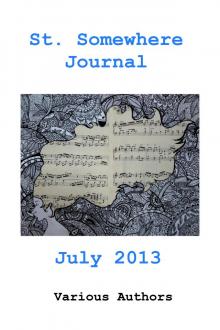 St. Somewhere Journal, July 2013
St. Somewhere Journal, July 2013 firstwriter.com First Short Story Anthology
firstwriter.com First Short Story Anthology Warcry: The Anthology
Warcry: The Anthology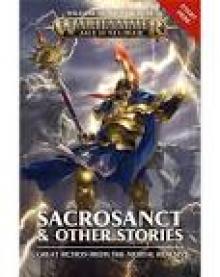 Sacrosanct & Other Stories
Sacrosanct & Other Stories Ultimate Heroes Collection
Ultimate Heroes Collection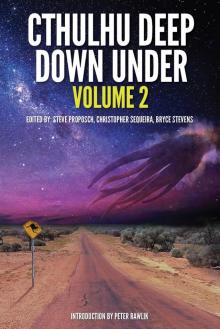 Cthulhu Deep Down Under Volume 2
Cthulhu Deep Down Under Volume 2 Erotic Classics II
Erotic Classics II Dynasties: The Elliotts, Books 1-6
Dynasties: The Elliotts, Books 1-6 Dynasties:The Elliots, Books 7-12
Dynasties:The Elliots, Books 7-12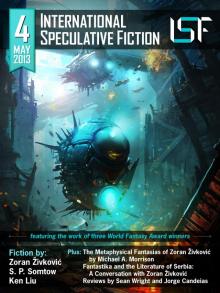 International Speculative Fiction #4
International Speculative Fiction #4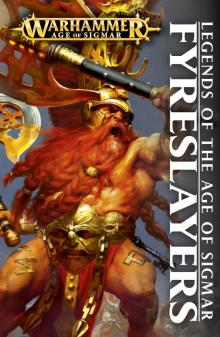 Fyreslayers
Fyreslayers One Night In Collection
One Night In Collection Mortal Crimes 2
Mortal Crimes 2 Some of the Best from Tor.com
Some of the Best from Tor.com Howl & Growl: A Paranormal Romance Boxed Set
Howl & Growl: A Paranormal Romance Boxed Set The Conan Compendium
The Conan Compendium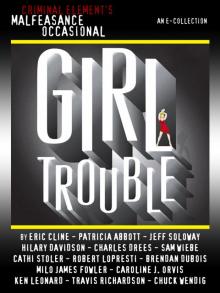 The Malfeasance Occasional
The Malfeasance Occasional Brides of Penhally Bay - Vol 4
Brides of Penhally Bay - Vol 4 Brides of Penhally Bay - Vol 2
Brides of Penhally Bay - Vol 2 Brides of Penhally Bay - Vol 1
Brides of Penhally Bay - Vol 1 School's in Session
School's in Session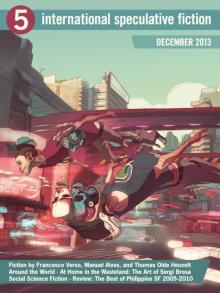 International Speculative Fiction #5
International Speculative Fiction #5 Erotic Classics I
Erotic Classics I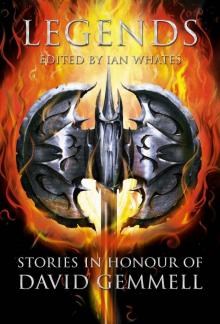 Legends: Stories in Honor of David Gemmell
Legends: Stories in Honor of David Gemmell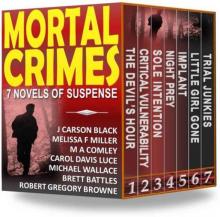 Mortal Crimes 1
Mortal Crimes 1 The Classic Children's Literature Collection: 39 Classic Novels
The Classic Children's Literature Collection: 39 Classic Novels Don't Read in the Closet volume one
Don't Read in the Closet volume one Some of the Best from Tor.com: 2014: A Tor.Com Original
Some of the Best from Tor.com: 2014: A Tor.Com Original The Fitzwarren Inheritance
The Fitzwarren Inheritance All Things Zombie: Chronology of the Apocalypse
All Things Zombie: Chronology of the Apocalypse Hammer and Bolter - Issue 12
Hammer and Bolter - Issue 12 Kiss Kiss
Kiss Kiss Dog Stories
Dog Stories Bad Blood Collection
Bad Blood Collection